The Lie of “Having It All”
They said, "You can have it all."
Career? Check.
Family? Check.
Mental stability? …Still buffering.
We grew up believing we could dream big. That we could have it all—the career, the independence, the family, the joy. We were told to work hard and claim our place in the world. And we did. We studied, showed up, chased goals, and believed success was just about effort.
But then we grew up, and reality came with fine print.
The world isn’t quite the same playground for women as it is for men. This isn’t a competition or an anti-men monologue. It’s about the invisible script many of us were handed—and the internal war it creates.
The Weight of Always Doing
The mental weight of trying to be everything to everyone. The guilt that follows you from office meetings to folding laundry. From Zoom calls to homework help. Whether you're leading a team, a household, or both.
This isn't just about working women or stay-at-home moms—this is about women trying to meet expectations that never seem to run out.
Be present, be productive, be polite, be perfect. Always be doing.
And somewhere in all this doing, we start to unravel.
When Independence Meets Expectations
I grew up in a household that valued independence—and that value became part of me. From a young age, I focused on building a life where I could support myself and contribute to my family. Success looked like having a good job, earning well, and enjoying life on my own terms. That was the dream.
And for a while, it worked.
My identity revolved around work, growth, and financial freedom—and it brought me joy. But after I got married, something shifted. Suddenly, I found myself in a space where I felt I had to choose between my career and my role at home. No one explicitly told me to step back, but there was an unspoken rule—a silent pressure—that now, as a wife and daughter-in-law, I had expectations to meet. Certain things I "should" be doing. And to meet those, I would have to let go of something else.
When I tried to keep doing what I loved—focusing on my career—the guilt crept in. Along with exhaustion. I was constantly drained, never fully present. I couldn't enjoy my work the way I used to, and I couldn't show up at home the way I wanted to.
Even on my days off, when I tried to rest, I couldn't. My mind would spiral: "I didn't help with house chores all week—now's my chance to catch up." Rest became something I had to earn. And if I did rest? More guilt.
Over time, I started to feel lost, constantly tired, craving breaks just to escape the mental load. The worst part? The frustration of not being able to give 100% to anything—not to the career I'd worked so hard for since my Master's, nor to the relationships and responsibilities I cared deeply about at home.
What About This Silent Comparison Game?
There's also a quiet envy that creeps in—especially when I look at the men in my life. The ones who simply wake up, eat breakfast, and head to work. It feels almost illegal for us to have that kind of ease. In every home I've seen, the women—whether working or not—start their day in the kitchen. Tea, breakfast, planning the day for everyone else.
The deeper I got into this, the more I started noticing the women around me. Friends, relatives, colleagues—all quietly stretched thin. Whether they had jobs or not. Whether they had kids or not.
It’s so deeply ingrained that even thinking about not doing it comes with guilt. That’s what makes it so hard—we’ve seen this pattern for so long, it’s hardwired in our minds as “normal.” So when we even consider doing things differently, it feels like we’re doing something wrong.
And that guilt? It’s suffocating. It makes you question yourself. You start to feel bad for not meeting society’s invisible checklist. You get angry at the world for setting up these roles, at loved ones for expecting you to follow them, and sometimes even at yourself for not being able to shake the guilt in the first place.
What About The Voice We Inherited?
It’s not just guilt. It’s internalized messaging—absorbed from years of watching the women before us “just manage it all” without complaint. It sits so deep that even when no one is saying anything, we are.
That tiny voice in your head that says:
"You should’ve done more. You’re falling short. You don’t deserve to rest."
It’s a constant tug-of-war between who you want to be and who you’re expected to be. No matter which side you lean toward, the other side pulls harder. That’s where you start to feel like a rubber band pulled from both ends—and eventually, something gives.
Usually, it’s your sanity.
This is the messy middle. That in-between space where you’re trying to hold your life together—your dreams, your roles, your relationships—and constantly feeling like you’re doing it badly. That constant tug-of-war between what you want and what you’re supposed to do.
It’s confusing.
It’s exhausting.
And sometimes, it’s lonely.
So What Do We Do Next?
There’s no perfect formula.
But here’s what I’ve started doing, slowly and with a lot of reminders:
Let the guilt come—but don’t let it run the show.
Just because you feel bad doesn’t mean you’re doing something wrong. Guilt is often a sign you’re doing something unfamiliar, not something bad.
Stop glorifying burnout.
Being tired all the time doesn’t prove anything except that you’re doing too much. You’re not failing by resting. You’re surviving.
Ask for help.
And not in the “let me know if you need anything” way. Be specific. Be unapologetic. No one gets a trophy for suffering silently.
Drop the Superwoman badge.
You’re not a bad wife/daughter/mother/friend if you can’t do it all. You’re human. You’re allowed to pick what matters most right now—and let the rest wait.
Stop measuring your worth by your output.
You’re not valuable only when you’re producing, giving, or performing. You’re enough—even on the days you’re in pyjamas, eating Maggi, and doing the bare minimum.
And If You’ve Ever—
Paused your dream to serve tea,
Skipped lunch to make someone else’s,
Felt resentful while cleaning,
Or questioned whether you’re “cut out” for the life you once wanted—
I see you.
You’re not broken.
You’re not weak.
You’re just a woman in a world that still expects you to do it all and be grateful for the chance.
So let’s stop pretending.
Let’s stop apologizing for wanting more and wanting rest.
Let’s normalize saying “I can’t today.”
Let’s let go of the idea that having it all means doing it all.
Because real success?
Might just be learning how to survive it—
without completely losing your mind.








